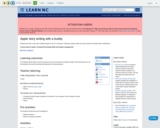
This lesson leads students to work with a partner to compile sentences, typing them on the computer.
- Subject:
- Arts and Humanities
- English Language Arts
- Reading Informational Text
- Material Type:
- Lesson Plan
- Date Added:
- 04/26/2021

This lesson leads students to work with a partner to compile sentences, typing them on the computer.
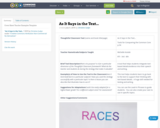
A tool that helps students integrate text-based details/evidence into their speech and writing.
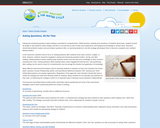
The ability to ask and answer questions while reading is essential to comprehension. This article discusses instructional strategies used to teach questioning and provides many online resources. The article appears in the free, online magazine Beyond Weather and the Water Cycle, which explores the seven essential principles of the climate sciences for teachers in k-grade 5 classrooms.
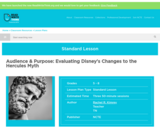
What drives changes to classic myths and fables? In this lesson students evaluate the changes Disney made to the myth of "Hercules" in order to achieve their audience and purpose.
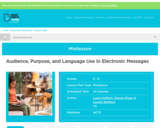
Students explore using electronic messaging and Internet abbreviations for specific purposes and examine the importance of using a more formal style of writing based on their audience.
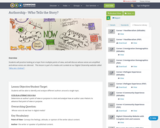
Students will practice looking at a topic from multiple points of view, and will discuss whose voices are amplified and whose voices are silenced. This lesson is part of a media unit curated at our Digital Citizenship website called "Who Am I Online?".
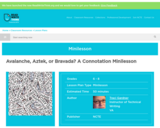
Students examine familiar car names for underlying connotations then proceed through a series of steps, increasing their control over language, until they select words with powerful connotations in their own writing.
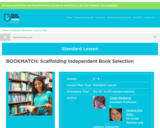
This lesson will be turning heads and pages as students learn how to choose appropriate books for independent reading exercises and later evaluate their choices.
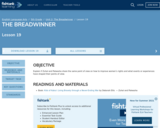
Explain if Zuhal and Palwasha share the same point of view on how to improve women’s rights and what events or experiences have shaped their points of view.
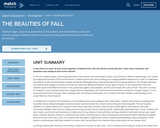
In this unit, students begin a year-long exploration of the seasons and how weather, plants, and animals are different depending on the season by studying the beauties of fall and fall harvests. Students launch the unit by setting up an ongoing weather experiment in order to understand the patterns of fall and how weather changes during fall. While gathering on-going data about the changing weather in fall, students will learn and observe what happens to leaves in the fall and notice the difference between various types of leaves. In the second half of the unit, students explore the different harvests of fall, particularly apples and pumpkins, and discuss the basic life cycles of both. This unit is a chance for students to stop and think about the changes that are happening in the natural world around them and why the changes happen. It is our hope that by the end of the year, after studying winter and spring in subsequent units, students will have a deeper understanding of the unique features of each season.
In reading, this is students’ first introduction to informational texts and reading to learn information. Students will continue to develop their inquisitive side by being challenged to ask and answer questions about the content and text they are interacting with. This unit exposes students to a subject matter that is present in their day-to-day lives; therefore, they should be challenged to ask questions and make connections between what they are reading and learning and what they are seeing outside. Additionally, while listening to stories, students will learn how to use the text and illustrations to determine the key details of a text and then use those details to retell what the text was mostly about. Students will also continue to understand the author’s and illustrator’s roles in writing texts and should be able to identify and explain both by the end of the unit. In this unit, students will also begin to explore the content in-depth by participating in labs and projects. These teacher-created projects will allow students to interact with and synthesize the material they are learning at an even deeper level.
In writing, students will continue to write daily in response to the text. As with units 1 and 2, students are focusing on using correct details from the text to answer the question. Students should be using a combination of words and pictures, depending on the student’s development as a writer. Daily teaching points, based on student data, should be included to ensure that students are progressing as writers.
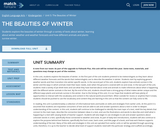
In this unit, students explore the beauties of winter. In the first part of the unit students pretend to be meteorologists as they learn about different weather forecasts and the words that meteorologists use to describe the weather in winter. Students start by exploring generic weather words and then transition into winter-specific words. In the second part of the unit, students explore how animals survive in the winter and the ways in which animals meet their basic needs, even when the ground is covered with ice and snow. In the last part of the unit, students read a variety of Jan Brett texts and use what they have learned about snow and animals to make inferences about what is happening with the different winter animals in the text. By the end of the unit, students should have a strong grasp of what makes winter unique and the different ways plants and animals survive in the winter. Due to the timing of this unit, it is our hope that students will have plenty of opportunities to interact with the vocabulary and content in the natural world around them. When outside for recess or anytime that it snows, students should be pushed to use the vocabulary and content they are learning in the unit so that the content can fully come to life.
In reading, this unit is predominately a collection of informational texts and builds on skills and strategies from earlier units. At this point it is assumed that students are inquisitive consumers of text and are able to ask and answer questions about a text in order to deepen understanding of the content. In this unit, students will continue to be challenged to identify the main topic of a text, retell the key details that connect to the main topic, describe the connection between ideas in a text, and use the illustrations and words to describe and retell what is happening in a text with varying levels of teacher support. Students will also begin to use strategies to ask and answer questions about unknown words in a text, specifically those connected to weather and snow. As part of daily text introductions, students will also continue to explore the purpose behind text features, specifically the front cover, back cover, and title page of a book, and how each feature supports understanding of the text. Many of the skills and strategies in this unit are spiraled from earlier units or will be spiraled through upcoming units; therefore, it is up to the teacher to decide what level of support students need with the particular strategy and scaffold accordingly.
In writing, students will continue to write daily in response to the text. At this point in the year, students should be using a combination of drawing and words to correctly answer the question. Pick focus teaching points based on data from previous units and individual student needs.
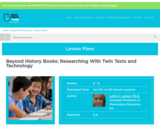
Students in Grades 4-8 activate prior knowledge and research information about a historic event through fiction and nonfiction literature and exploration of relevant websites.

Beyond Penguins and Polar Bears is an online professional development magazine which focuses on preparing elementary teachers to teach polar science concepts while also integrating inquiry-based science and literacy instruction. The project draws on research showing that an integrated approach can improve student achievement in science, as well as in reading comprehension and oral and written discourse abilities. Ultimately, the project seeks to bring the polar regions “closer to home” for elementary teachers and their students.
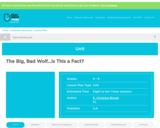
Reading is revamped in this lesson in which students use a multimedia approach to study the books by Seymour Simon.
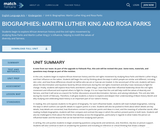
In this unit, students begin to explore African-American history and the civil rights movement by studying Rosa Parks and Martin Luther King Jr. and their influence on the nation. Students will begin the unit by thinking about the ways in which people are similar and different, including skin color, and how those differences should not define who we are or how we are treated. In the second part of the unit, students will learn about the discrimination and injustices faced by African-Americans during the civil rights movement and why it was necessary to fight for change. Finally, students will explore Rosa Parks and Martin Luther King Jr. and study how their influential leadership drove the civil rights movement and influenced and inspired others to fight for change. It is our hope that this unit will help instill the values of diversity and fairness, and that it will serve as a launch for further discussions around discrimination, fairness, and valuing individuals. This unit also falls during the month of February. Therefore, it will give students a chance to explore and deepen their understanding of Black History Month and why studying and celebrating black history is an important part of our nation’s history.
In reading, this unit exposes students to the genre of biography. For each influential leader, students will read multiple biographies, noticing the ways in which authors use specific details to support points in a text. Students will also be pushed to think about which details are key details, how details are connected, how illustrations connect to particular points and ideas in a text, and the meaning of unfamiliar words. After reading multiple biographies, students will then compare and contrast the ways in which the authors present points in both texts. Students will also be challenged to think about the themes that develop across the biographies, particularly in regards to what makes the person an influential leader and the lessons that can be learned from studying each person.
In writing, this unit pushes students to begin answering questions using words and sentences, and, therefore, rely less on picture support. Students will also continue to work on answering the question and including an inference or critical thinking that shows a deeper understanding of the text. At this point, all structure focus correction areas should be taught; therefore, the focus of this unit should be on providing individualized feedback to students who are not at a 3 or 4 on the rubric.
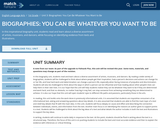
In this biography unit, students read and learn about a diverse assortment of artists, musicians, and dancers. By reading a wide variety of biographies, students will be challenged to think about where people get their inspiration, how a person’s decisions and actions can change his or her life, and how hard work and determination can change a person’s life, especially when facing instances of prejudice and discrimination. Students will also be challenged to think about the ways in which a person can be influential and how reading about other people’s lives can help them in their own lives. It is our hope that this unit will help students realize they can be whatever they want to be if they are determined and work hard, and that no obstacle, no matter how big it may feel, can stop someone from achieving something they are determined to achieve. It is also our hope that this unit will open students’ eyes to different life paths and passions, particularly those in the arts.
In reading, this unit builds onto the work done in previously informational units. It is assumed that students are inquisitive consumers of an informational text, asking and answering questions about key details. It is also assumed that students are able to find the main topic of a text and retell key details that fit with the main idea. In this unit, students will focus deeply on cause and effect and describing the connection between individuals, events, and information from the text. Another main focus is on identifying the reasons an author gives to support points in a text. Students will be challenged to think about the big ideas of a text and what details the author includes in both the text and illustrations to support the key ideas.
In writing, students will continue to write daily in response to the text. At this point, students should be fluid in writing about the text in a structured way. Therefore, the focus of this unit is on pushing students to include the best and most accurate evidence and then to explain the evidence with inferences or critical thinking.
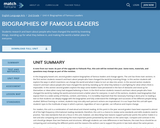
In this biography-based unit, second graders explore biographies of famous leaders and change agents. The unit has three main sections. In the first section students research and learn about people who have changed the world by inventing things. In this section students will explore the ways in which inventions can change the world and what it takes to turn an idea into action. In the second section students research and learn about people who have changed the world by standing up for what they believe in and fighting for what others think is impossible. In this section second graders explore the ways some leaders have persevered in the face of obstacles and stood up for themselves or ideas when many had stopped believing in them. In the third section students research and learn about people who have changed the world by making the world and environment a better place for everyone. In each of the sections, students read biographies that expose them to a wide variety of themes, content, and history. It is incredibly important that the necessary framing is done prior to reading a text so that students can deeply engage with the biographies and fully understand the challenges and successes of the different people being studied. Without framing or context, students may miss why each person’s actions are inspirational. It is our hope that this unit will open students’ eyes to the multitude of ways in which a person, regardless of race or gender, can influence and inspire change.
For readers, this unit is a combination of read-aloud and shared reading. At this point in the year second graders have been exposed to almost all of the high-frequency informational reading standards; therefore, this unit is a chance to review some standards and skills students need to practice. Two new standards that are a focus in this unit, however, are describing how reasons support particular points the author makes in a text and also comparing and contrasting the most important points presented by two texts on the same topic. Compare and contrast in this unit should go deeper than text features and structures. Although students can note differences in text features, the main focus should be on comparing and contrasting the different points and the reasons the authors use to support the points in two texts about the same person.
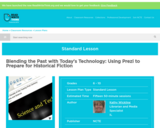
To prepare for literature circles featuring historical novels, students research the decades of the 1930s to the 1990s and share their information using Prezi, a web application for creating multimedia presentations.
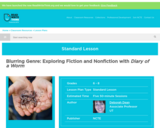
After reading several examples of how a published author incorporates facts in fiction writing, students research a topic of their choice and write fictional diary entries that incorporate factual information.
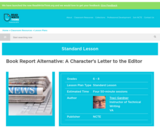
Students write a persuasive letter to the editor of a newspaper from a selected fictional character's perspective, focusing on a specific issue or situation explored in the novel.